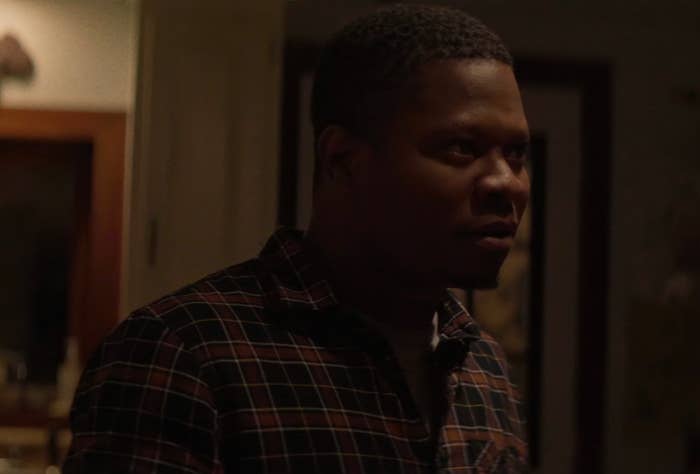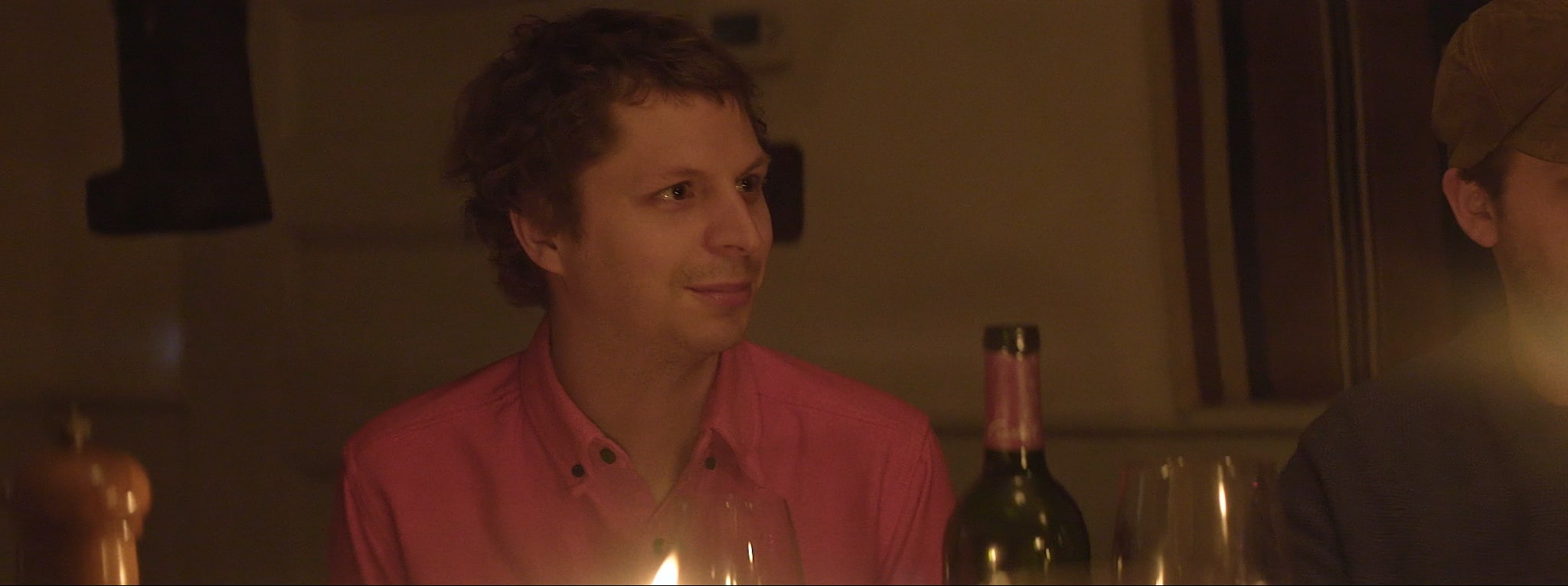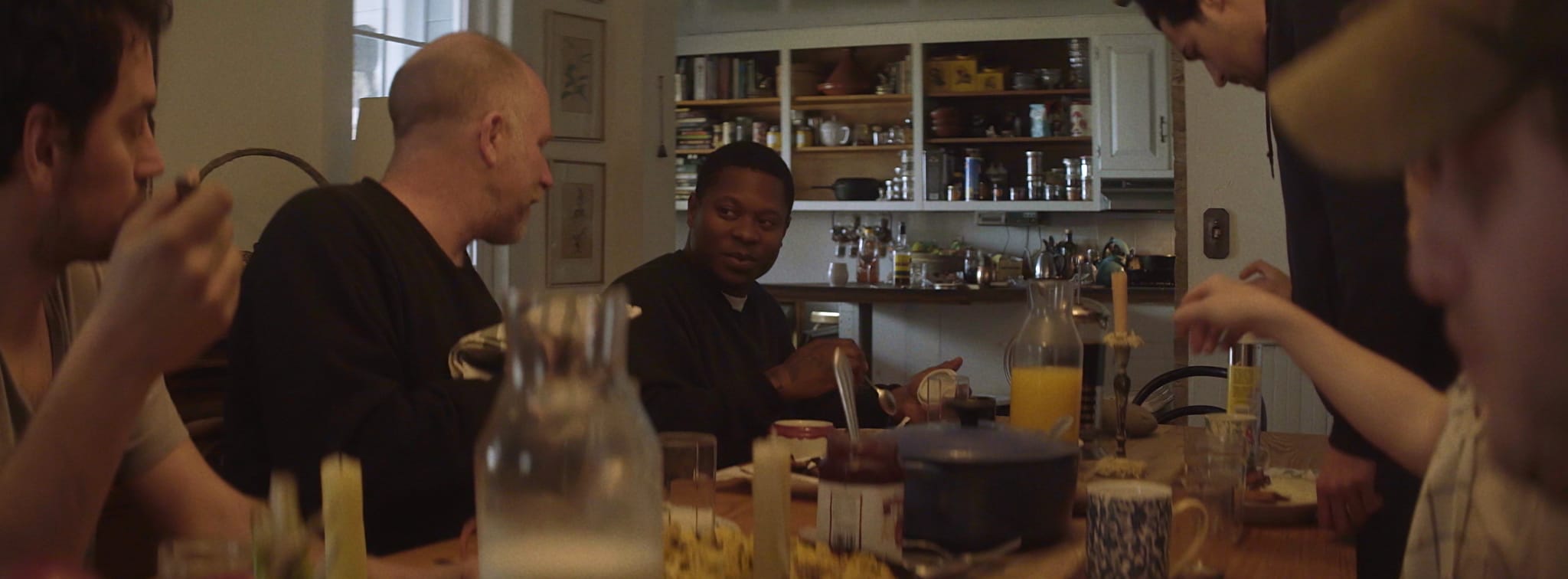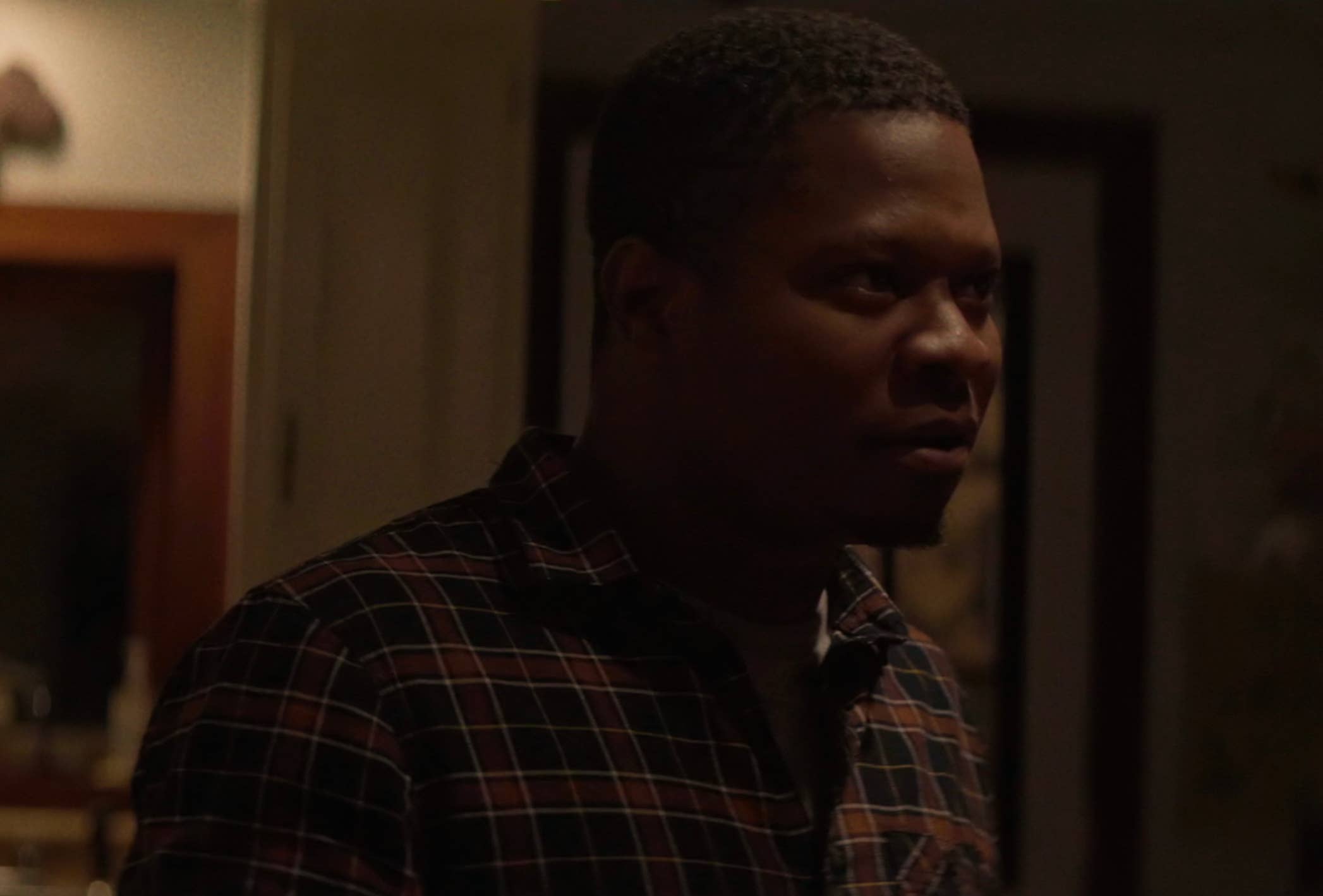
Sebastián Silva’s latest film, Tyrel, is out in theaters today, marking another forward journey into the maniacal edge of superficially safe situations. In fact, a number of eagle-eyed cinephiles might’ve noticed the picture being marketed as a Get Out-esque film, but the comparison is not dead on. Silva has built a filmography of complex subjects being led by dysfunctional protagonists. In Tyrel, Silva (who wrote and directed the film) speaks to the simmering discomfort and microaggression-filled tensions that span from sea to shining sea in America with Jason Mitchell as the film’s steward. Whether veiled or explicit, Tyrel proved to be one of the most divisive films to hit screens this year.
With the film out now, you can argue amongst yourself about if Tyrel is a piece of work where nothing happens or if it is one where everything happens. If the trailer is any indication of the roller-coaster ride you’re placed on, Jason Mitchell (Mudbound, Straight Outta Compton) soars as Tyler, a man who joins his best friend Johnny (Christopher Abbot) for one of his friend’s birthday weekend excursion in the Catskills. The all-white, snow-filled, far-away-from-city-life Catskills. Quickly learning that he’s the only black man among the group, Tyler takes moviegoers on an emotionally anxious, terse-filled romp into the dynamics of being “the only one in the room”.
We got a chance to sit down with both of these provocative players to talk about working with each other, the art of white microaggressions, reparation hugs, and reminiscence over the funny genius of the late Reg E. Cathey, who filmed his last role in Tyrel before he passed.
First thing that must be asked is about the marketing of the film as “Get Out but without the thrills.” Was this done more to draw in audiences or was it a part of the film’s marketing plan?
Sebastian Silva: Personally, I was responsible for writing and directing the movie, so you can’t really help what the reviewers say. I assumed from the beginning that the comparisons [to Get Out] were going to be inevitable because the premise is so similar, but to be completely honest, when I came up with the “idea” of this movie, I hadn’t been aware of Get Out. And then somebody mentioned it, I watched the trailer couldn’t really understand was Get Out was about. It was ambiguous in a good way, but I just didn’t know [the impact]. And then [Tyrel] even went as far as having the same antagonist, the same actor [Caleb Landry Jones] in it. So, I was like, ‘Fuck, man. I just made a movie that is very much like another one.’
But my intention, if anything, was to do the other side of [that film], the opposite of what Get Out was doing, which was to leave it extremely ambiguous. I think [the comparison] was unnecessary and Tyrel is really a different thing, but specifically, I believe the American people can be very reductionist. From stereotyping actors to stereotyping movies, I am not really surprised by those responses. But, as the same as you, I see why it was done. I understand completely why people are comparing them. But for me, I see these two projects very separately.
The premise of this film was most young black men’s experiences throughout their childhood or teenage years. In Tyrel, we see those play out through Tyler, with Jason being an interesting casting choice. Sebastian, what was it about meeting him that made him your choice? And Jason, what was it about working with him that made you sign onto the role?
Jason Mitchell: Well, the beautiful thing about working with Sebastian was the fact that neither him or myself had an agenda, you know what I mean? We weren’t trying to make a “woke” movie or nothing like that. We just wanted to simply make a movie about this situation involving these characters. Sebastian called me up and he asked me to help fine-tune the script, so when we did I thought it was dope that Tyler was everybody, you know? Everybody at one point has been Tyler. Everybody black that I know has been him, you know, so I was like, ‘Alright, this could be really, really cool.’
Tyrel has this sort of dark feel to it that subconsciously you’re almost sure that you’re watching a horror movie. To be the only black person in that situation, that’s what makes it so horrifying, and people don’t know what we go through on an everyday basis. But the film didn’t have an agenda, it just wanted to tell a story, and, you know, it all worked out. Sebastian actually came and slept on my couch and we did all these things.
We discussed the role and I said that there was one thing he hadn’t see me around, which was a lot of white people. So, we went to a white restaurant and different white places like that, and he saw everything that I had to do to interact in that space. So, to prepare for the role and even in working with Sebastian, my life on a day-to-day basis has prepared me for this film. Like 100%.
Silva: I went to meet Jason in New Orleans, where he picked me up in his car and we hung out for three days non-stop. I met his family, his friends, we got high, we rode bikes around New Orleans and we just connected. There was a song for Tyrel that he really loved. We ended up having a problem with the song and it needed to be replaced. I’m not sure which version of the film you watched, but it is the song that is played in the car. It’s this kind of crappy hip-hop that’s not trendy, but we went in with it and a couple of other songs we could afford. Jason was so invested in getting the best out of this film and the role, we both decided on the one that ended up in the movie.
How would you describe the art of white microaggressions lobbed at Tyler throughout the film? Also, talk about if there were any discussions about a “trigger warning” for the big scene in the third act.
Silva: Yeah, man, even the title of the movie is a microaggression itself. The line where a guy calls our protagonist “Tyrel” instead of Tyler can be construed as a microaggression, but Tyler lets it go pretty quickly. The movie is filled with microaggressions, and for me, it is something that I am leaving up to Tyler and the audience as to whether to let these characters pass or stop there and make a comment. Are they egging him on? Or is this only part of their complete unawareness to the “other”...? The questions come from a place of white privilege and the obliviousness that comes with that.
I give you a list of questions in this film and that’s really the heart of what the movie is. The microaggressions are landing occasionally in the story and creating these ambiguities for the audience and the lead character himself.
When I wrote the movie it was not really what these other characters do, but what he does when they’re doing it that really sent me spiraling. He’s the one who gets cornered by social obligations and how he participates in some of the most stickier scenes sends him spiraling in interesting ways. Tyler is used to these microaggressions anyway, so he’s developed a tough skin, but you can see when he’s called “Tyrel,” he just smiles kind of tiredly and he’s like, "dude, it’s Tyler," and doesn’t make a big deal out of it.
When things get a little trickier, you see how Tyler reacts to it and how he finishes out the scene, which should entice a discussion from the audience when they see how he experiences these microaggressions.
Michael Cera has the distinction of delivering two of the film’s most twistedly ominous lines in the film. The latter being, “Don’t ever trust the white man.” As the film’s screenwriter can you speak to the feeling you have when crafting lines such as this? Also, with wordplay being thrown around loose like this—example the “accent” scene—what do you intend the impact to be when audiences hear just how Tyler interacts with these characters?
Silva: Michael’s character is complex in the sense that he’s very outspoken, and doesn’t seem to be scared to offend Tyler. When Michael comes into the room, wearing the wetsuit, and he’s like, "You see, Tyler, you’re not the only black man in the room," you see Tyler laughing instead of feeling upset or annoyed. There is something about the directness of Michael’s character that, I believe, for Tyler is a bit of fresh air.
It was also a way to juxtapose behaviors from white people or white liberals in how they act—conscious or unconscious. In this very particular case, Tyler reacts positively to Michael’s outspoken personality. His character isn’t walking on eggshells or anything like that. They become friends and you eventually learn more about Michael’s character.

Mitchell: There are moments that build on the moment and turns into something beautifully horrifying. But then it evens off when you get to meet Michael Cera who, not only is a really brilliant filmmaker himself, but also just a really cool soul. He gets it. He leveled off everything for me because I believe that he and I have the chemistry that the world tries to hide behind, if that makes sense? But film aside, Michael was such a pleasant soul and he taught me a lot about film in those 11 days that we had to get it done.
There’s a moment in the first act after introducing your character where you receive the Reparations Hug from a white character in the film. Can you speak on a moment where that’s happened in your life and you’ve caught that it was happening?
Mitchell: I just bought a house in Atlanta, and the Homeowners Association is very, umm, inquisitive. They have a lot of questions about who is around the area and other things are going on that leave me a bit confused at times. I’ve had people bring me pies and stuff like that, but on the other end are also like, “Yeah, I used to go on Search-And-Destroy missions,” which is wild because just because I’m black doesn’t mean I’m aggressive, you know what I mean?
Then you have people who want to give you the hug, and I believe that there are just different approaches to it. I am very appreciative of these people who mean well and just look at people for who they are because being white or black don’t make you no better or worst than anyone else. Everything that the Bible teaches you is already written in your essence, and that doesn’t matter if you’re black or white, so Tyrel makes this discussion one that we have to tackle as a people.
It needs to be called out more, which means a movie like this shines a light from a different angle. That’s the beautiful thing about Tyrel is that you can see it from every viewpoint.
Sebastian, you’ve said that you made Tyrel specifically for Americans. With all that is going on in the news here in the U.S., how do you hope this impacts American theatergoers? What is the payoff that you as the filmmaker and writer are hoping to have?
Silva: I started saying that this film was made for Americans because after screening it, American audiences reacted the strongest to Tyrel. Black people and white people—everybody shares these central feelings of extreme tension—and the signs are there because of the history of the country, more than what you actually see on-screen. People outside of America don’t react as strongly as those within the country do because of the history and how they carry their own race dynamics.
As you watch the movie end, I knew that that was what I wanted the audience to see. Even if some directors and producers were really getting on me to push the envelope, you know? And it felt really wrong to go down that road, so even with that obstacle, I was able to keep the message tiny and subdued. Outside of that I was never fully, fully-conscious of the tensions that I was creating within the film. Like in one scene Tyler goes out drunk, but people in the theater were saying, "dude, there’s no way in hell a black man in America goes out by himself in upstate New York," which happened…but other people would disagree.
I know my main character is in a very white state with a lot of potential dangers looming, but I personally wasn’t aware of the potential danger I was implying with those challenges. From blindfolding one another to the machete scene, I am thinking that these guys are just friends and are only playing. I wanted to concentrate more on Tyler’s psychology which is why I feel this movie is accidentally made more for Americans than anyone else.
Tyrel was also the last film to feature the late Reg E. Cathey. Can you all share any lasting impressions you had of the man? Or speak to anything you learned from him that you won’t forget?
Silva: Yes, yes, I met Reg when I made Nasty Baby, which he was a character in. He played this mentally-handicapped homeless man that lived in hipster-gentrified Brooklyn and ends up killing a person, which was played by me, and so we had a pretty tight connection. His character in that film could play the saxophone, so when I invited him for Tyrel I asked him to play because I really loved how he played the saxophone.
And as you can see, he is very gifted, and he was such a nice man. The filming was a very beautiful night of shooting and he got everyone so happy playing the saxophone. I’m really happy that he got to do that on film.
Mitchell: You know what was also so crazy about Reg was that he was the kind of guy who was very much your uncle even though he didn’t know you [laughs]. He was like that daddy that would whoop all the kids even if they weren’t his [laughs]. On set, we laughed and we joked, but when you put the scene together it is not that, so it was really hard for me not to laugh in the scene because it was already funny with Reg joking around and cuttin’ up. Plus, I’m already playing drunk, so I’m trying not to lose the momentum and build it up and create the scene. There was a lot of comedy up underneath it, and trying not to break was hard for the both of us, man. That guy [laughs], he’ll be missed.

The film’s music team helped to drive home some of the film’s creepier and more awkward moments with tones that helped to ramp up the uncomfortability (ex. the “End of the World” song in the 3rd act). Did you have a hand in creating those tense moments given your work on music soundtracks as a member of CHC?
Silva: We didn’t really have a music supervisor on Tyrel, so I worked on the music in the film along with others. I picked R.E.M. for the final act because it feels like a band that every white person knows but not necessarily every black American knows. There was something vintage about R.E.M. and the song being set in this house out in the woods, it seemed like a moment in the film where the other characters would forget about Tyler.
Jason didn’t know who the fuck R.E.M. was, so doing the scene didn’t feel forced and it didn’t feel like it was prejudice because Jason actually didn’t know R.E.M. before the movie, I think.
The last question I have is about your hip-hop roots, Sebastian. Playing off the CHC song, “Me Inspira,” I wanted to know now as a filmmaker what inspires you to create and not succumb to complacency?
Silva: [Laughs] Nobody ever mentions CHC to me ever in America. Right now, what inspires me is the moral ambiguity in my work. In both Tyrel and Nasty Baby, I am interested in creating this civilized dialogue among people that want to discover things with each other instead of pushing one’s own agenda. So, I am inspired by creating stories, characters, and situations that don’t seem so easy to really get a hold of. It is something that I’ve akin to inviting people over to discover something interesting together.
Tyrel was really challenging because race in America is very tricky. The main character is black and I could’ve easily been accused of appropriation, and so on. I just decided that I wanted to take the risk and challenge myself to do the work. I really wanted to make sure this wasn’t tone deaf, but if at any point it is, I’d want to be called out because the one thing Tyrel will not be is tone deaf. And that’s what is keeping me inspired. It’s not that I want to provoke just for the sake of provocation, but tapping into sketchy subjects are things I want to discuss.


